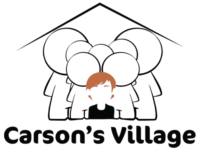Coping with loss takes time and impacts people differently, both emotionally and physically. Here we list resources to aid in the grieving process.
*Carson’s Village does not endorse any of these services over another.
Therapy: Psychology Today provides an easy-to-use search engine to help you find the right therapist for you. You can search for therapists in your area by insurance, topic, gender, and more. Not sure if therapy is right for you? This article by the American Psychological Association provides research and insight into therapy and how to get the most out of your therapy sessions.
24-hour crisis counseling telephone line: (972) 233-2233
Support Groups and other resources:
The Compassionate Friends https://www.compassionatefriends.org/
- Self-help support organization whose mission is to assist bereaved families as they walk the grief journey following the death of a child of any age and to provide information to help others to be supportive to those who are grieving.
- Sharing with others is the very heart of TCF chapter meetings. Chapter meetings are havens where members feel free to talk about their children who have died, the emotions they are going through, the painful and sometimes thoughtless comments that may have been made to them, their feelings of sadness, guilt, and/or anger, and other subjects no one else wants to hear them talk about. They discuss the progress they are making and ways of coping that have been helpful to them.
- With the guidance and reassurance of members who are farther along in their grief journey, gradually members can learn how to survive and begin to rebuild their lives.
- The Compassionate Friends is not a therapy group nor are chapter meetings “therapy” sessions. At chapter meetings, members learn they are not alone in facing this terrible tragedy – others attending the meeting have also faced the isolation and desperation the loss of a child can bring. Chapter meetings are beneficial to those who are coping effectively with their loss as well as those who may feel discouraged by a lack of progress. While there are no instant solutions, no easy answers, and no timetable for grieving, TCF provides comfort and a sense of direction through the cumulative knowledge, understanding, and grief experience of its members. Sharing their story and their journey, bereaved families are able to find hope, healing, and the will to survive.
National Organization of Parents of Murdered Children (POMC) http://www.pomc.com/
For the families and friends of those who have died by violence
- POMC makes the difference through ongoing emotional support, education, prevention, advocacy, and awareness.
- POMC local Chapters hold monthly meetings, provide a telephone network of support, supply information about the grief process, organize a speakers’ bureau, and provide accompaniment for survivors who attend court proceedings. Many Chapters publish their own newsletter.
- In areas where there are not enough members to sustain a Chapter, Contact Persons provide much of the same level of support.
General Coping with Grief: Adapted from cancer.net. and What to Do When the Police Leave by Bill Jenkins.
No one person is the same, so each person processes and deals with grief differently. Remember, grief takes time, so be patient and allow yourself to feel the pain of loss. People show emotions differently than others, so outward exhibitions of grief differ by person. You are on your own timetable, do not let others or even yourself push you to get over grief.
Be realistic with your expectations. Your habits, routines, and priorities may change, and that is okay. You will redefine your “normal” while still dealing with the constant grief and sorrow. You may feel guilt or wonder what you did to deserve this, but remember most of your guilt involves things you could not have changed, and even if you could have, would not have changed the outcome.
Acceptance is a term thrown around by many people after a loss. “Accepting a situation doesn’t mean liking it or that it is “acceptable,” it simply means that you recognize its reality in your life and are willing to determine how you will deal with that reality” (Bill Jenkins).
Other tips for coping with loss include:
- Talk with others
- Find creative outlets
- Engage in physical activity
- Give yourself a break from grieving
- Maintain a routine
- Forgive yourself
- Find ways to connect
- Take care of yourself
- Join a support group
Coping with the loss of a co-worker: Losing a co-worker is often unacknowledged when discussing grief. This article by the American Psychological Association provides suggestions on how to identify and manage your grief following the loss of a co-worker.
Coping with a suicide loss: Loss by suicide is often sudden and unexpected. This article by the American Psychological Association provides suggestions for how to cope personally with loss by suicide, how to talk to children about suicide, and how schools should handle loss by suicide.
Coping with homicide loss: Losing a loved one to homicide can be traumatic and sudden. Included in the stress and emotional upheaval of the loss are the stress of the criminal justice system and media involvement. Head over to The Network of Victims Assistance to learn more about the aftermath of a suicide and to find more support resources.
Coping with Change: Loss can be stressful and includes changes. Friends and family will want to help, and it is okay to accept and ask for help. This article provides tips for how to better deal with that change.
For additional information on grief, visit this article: https://choicemutual.com/dealing-with-death/
